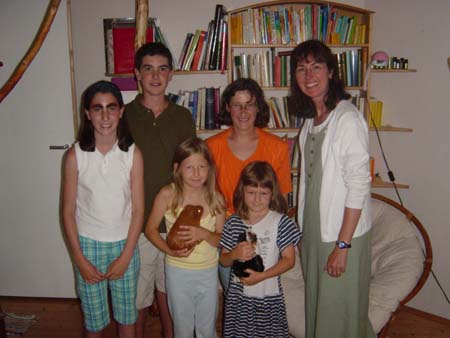Thursday, July 24
Today we drove almost 400 kilometers from Switzerland to Marktoberdorf in Germany. The drive took us around 5 hours, and went fine (only 1 wrong turn!). We thoroughly enjoyed driving through the various mountain ranges in Switzerland, and it was fun crossing the border into Germany. One disappointment is that the border crossings are fairly uneventful - we were expecting a more official sort of procedure. All that the border police do is kind of glance at your passports and wave you through. We've had to ask specifically to get our passports stamped (just for fun!) - each time they've acted like it's a hassle for them to do this!
Once again, our little navigation system that we've put together with a hand-held
GPS and our laptop was a lifesaver. The roads in the towns are not well marked,
and the highway numbers never seem to match what the map says. Also, there's
no mention on any signs of North/South/East/West. All they have are lists
of cities and you're supposed to pick a direction based on the list. Of course,
we had no idea of where most of the cities were, so we couldn't rely on the
signs to tell us which direction to take on the highways. Having the route
painted for us on our laptop was the only way!
The ride was interesting because we had to cross the borders between Switzerland, Germany and to our surprise, Leichenstein. Leichenstein is a small country roughly 60 sq km. They are a constitutional monarchy and the King's Palace appears to be visible from the highway. It poured the entire 15 minutes that it took us to drive from one end of the country to the next, so we amused ourselves by stating we had "bad weather during our holiday in Leichenstein."
We arrived in Marktoberdorf, a town about an hour southwest of Munich, around 2PM. After checking into our hotel, we drove to a small village called Leuterschach to the home of the Helfensdoerfer family. We contacted the Helfensdoerfers through Servas, an international organization set up to arrange for travelers to meet host families in countries around the world. The Helfensdoerfer family lives in a farmhouse, and we enjoyed visiting with Annette and her two daughters Heidi and Ida. We also met their two pet guinea pigs.
David and Katie recorded some of the things that Annette shared with us about living in Germany:
Family Life:
" The nuclear family is most important but extended families ususally
live close by
" Families consist of a small number of children, usually one or two
" Families don't move often or travel from their home or place of birth
" Communities, especially in the villages are friendly and caring-everyone
knows one another
" The Catholic Church is important in daily life and churches are found
in each village center
" In the villages, the women often work at home especially while their
children are growing up-there are not many options for the care of children
outside of the home
" Living is simple and money is used to purchase homes, farms and to
save for retirement.
Education:
" Children are required to attend school for nine years
" Home schooling is not allowed in Germany
" Children begin learning English in the 3rd grade and study English
until they complete their schooling
" School days are shorter than in the U.S.--ending at either 12:00 or
1:00 PM
" They have shorter but more frequent school holidays (for example Ida
and Heidi were just finishing school this week and will have only 6 weeks
off for summer vacation)
" Public education is free in Germany, even at the university level
Concerns/Impressions:
" People are concerned about unemployment, health care costs and the
ability to pay for pensions since there are so many more older adults than
younger people
" People felt changing over to the Euro for currency was raising the
cost of living but now seem to have gotten used to the Euro
" Annette felt most Germans were against the war in Iraq but don't talk
about it much
Sports & Recreation:
" The most popular sport in Germany is football (soccer)
" Other popular sports include cycling (especially Tour de France), hiking,
ice skating and swimming
" Basketball is less common in Germany
" Many people play instruments and enjoy music including musicals and
opera
Food:
" Breakfast is a light meal and usually includes bread, jam and coffee
or tea
" Dinner is their main meal served at 1pm (after school is out)-many
shops close from 12:00-2:00 to allow time for this main meal
" Supper is usually smaller at 7:00PM with sandwiches, light meats such
as sausage or pork, cheese and bread
" Favorite foods include pork (wienerschnitzel), sausage, turkey or ham,
soups and potatoes
" Child like pizza and spaghetti (we are coming to understand that these
are universally liked foods, especially for children)
Annette and her daughters shared with us homemade bread and "Sky Cake" a wonderful meringue cake made with red currants fresh from their garden. We also had fun meeting their guinea pigs and seeing pictures of their recent litter of 6 babies. We also learned that children use the word "cool" to describe things they like, even in Germany! ~Paula
Distance Walked: 1.05 miles
